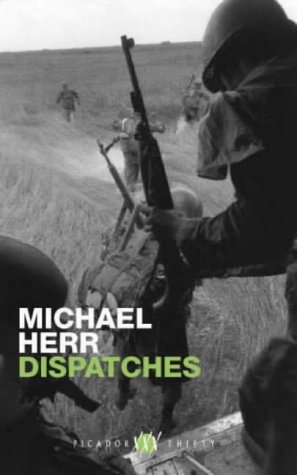Dispatches Review

November 23, 2014
One of the most common, general topics of literature is war. Whether it is fiction or non-fiction, war novels are and have been prevalent for centuries. Dispatches, written by Michael Herr and first published in 1977, is one of the first ever novels to accurately portray the experiences of American soldiers in the Vietnam War. The straightforward writing style, coupled with the various anecdotes from Herr’s time as a war correspondent for Esquire magazine, forms a brutally realistic picture of what the war in Vietnam was like for American soldiers and reporters alike.
The book is broken up into six separate parts: “Breathing In,” “Hell Sucks,” “Khe Sanh,” “Illumination Rounds,” “Colleagues,” and “Breathing Out.” Each section is focused on a specific setting, idea, or recurring instance. “Colleagues” for instance, focuses on other war correspondents Herr encountered during his time in Vietnam. Among these fellow journalists are Sean Flynn and Tim Page. In order to not give too many specifics away, I shall leave the individual specifics of the other parts undisclosed.
Dispatches has often been categorized as a journalism novel, for the style in which Herr (who was a journalist for some time) writes the novel. However, like it has been previously stated, this is nothing like a simple recounting of events. Whereas other non-fiction novels will give cold, thorough facts about historical events (which is interesting in its own right), Herr’s journalistic and personal approach adds something extra to the mix. When I say “journalistic,” it’s not like you’re reading a 200+ page paperback edition of Time magazine’s top 50 Vietnam excerpts. Instead, Herr immerses you in the numbing effects of Vietnam in the late 1960s, an open ground where you were never truly safe.
Those who attend Oratory may know or remember reading Tim O’Brien’s The Things They Carried in their sophomore year. On a side note, The Things They Carried is another excellent Vietnam War novel and I highly recommend. However, The Things They Carried, and other war novels similar to it, only provide the stories of generally one person and his unit. Dispatches covers various aspects as opposed to just one story about one soldier and his group of fellow soldiers. From the journalist’s daily jargon to the barracks of encircled base camps, Herr captures it all.
Apart from the previously listed qualities, there’s something else to this book, something that can be difficult to describe. The (at times) grotesque imagery and scenarios mixed with the almost surreal storytelling creates this pseudo-universe. A universe where we are reminded of the horrible things man can do to one another. A universe filled the sights, smells, and sounds of a distant, now non-existent place. It is the precise description of this lost world and the experiences had within it that Herr adds yet another twist to his marvelous novel.
Some final words to be said. For those who love history, and who enjoy a good non-fictional read, Dispatches is certainly a book for you. The unique writing style and crisp telling of grim history which was the Vietnam War adds to the mix of superb aspects of Michael Herr’s. So, in order to experience the favor aspects of a core facet of 20th century history, Dispatches is a must read novel.